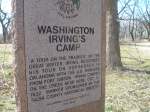The Washington Irving Society, an author society which falls under the umbrella of the American Literature Association, was resurrected during the 2009 ALA conference in Boston.
According to curators at Historic Hudson Valley, “many years ago, when this organization was called Sleepy Hollow Restorations, staff members along with consultant Andrew Myers formed an affinity group called the Washington Irving Society. It was run by SHR, now Historic Hudson Valley. Irving scholars, book collectors, and assorted devotees joined by paying a modest fee. The group hosted a few scholarly conferences and published a newsletter. (At that time SHR also maintained a publishing arm called Sleepy Hollow Press. It published many Irving-related titles, but was eventually sold to Fordham University). As Andy reached retirement, and the organization shifted its mission away from supporting scholarly publications, the Washington Irving Society was disbanded.”
The new society plans to unite scholars with other Irving enthusiasts by having a website that caters to the needs of all interested parties. The group will also host panels at various conferences, support and encourage efforts at Historic Hudson Valley to preserve Irving’s legacy, and encourage young scholars to consider Irving. The Irving Society hosted a panel, round table, and business meeting at ALA 2009 in Boston. The society also hosted panels at ALA 2010 and 2012 in San Francisco, 2011 and 2013 in Boston, and 2014 in Washington, D.C., as well as a special panel at SCMLA 2010 in Fort Worth. And we have continued to host at least one panel at ALA from 2009 through 2019.
During ALA 2014 in May, we completed our by-laws. During Summer 2014, we began applying with the State of Texas for a non-profit Certificate of Formation. In May 2017, we were finally approved by Texas. During the pandemic, we took care of our 501C3 paper work and payment, and received our letter of 501C3 status in 2021.
At the May 2017 ALA meeting, Sean Keck was named the new vice-president, and Tracy Hoffman continues as president. In May 2018 and 2019, Hoffman and Keck were again named as president and vice-president. In 2019, it was decided that John Dennis Anderson would coordinate Facebook and Jeffrey Scraba would work on Twitter in Spanish. In 2020, the officers agreed via email to name Kirsten Stine as treasurer until we could get together in person to vote. We did not meet at ALA in 2020 or 2021 due to Covid and travel disruptions, but we were back for Chicago 2022, Boston 2023, Boston 2025, and we intend to have panels at Chicago 2026. Officers have remained the same since 2020.
You can reach us at:
washingtonirvingsociety@gmail.com
* * *
Washington Irving Society
c/o Dr. Tracy Hoffman
Baylor University
Department of English
One Bear Place #97406
Waco, TX 76798-7406


